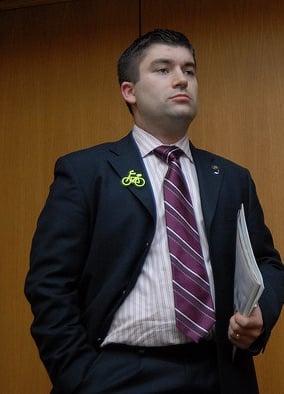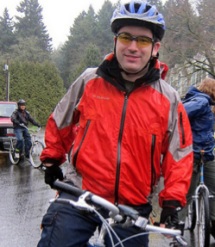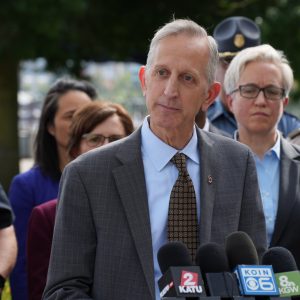
first became a state legislator in 2009.
(Photo © J. Maus/BikePortland)
Multnomah County Commissioner Jules Bailey has told the Willamette Week that he’ll enter the mayoral race.
This surprise announcement means current candidate Ted Wheeler won’t have the easy ride into City Hall many expected when Mayor Charlie Hales recently decided he wouldn’t run for re-election. Bailey, 36, has a significant political background from his stint as an Oregon state represenative and he’s very well-known among many Portland voters — especially voters who care about active transportation issues.
“…We can more effectively manage our transportation system by using transportation dollars not just for projects built for cars, but also for projects that reduce the need for cars.”
— Jules Bailey
In 2008 Bailey was endorsed by the Bike Walk Vote political action committee. Before he even got to Salem, he came out against the highly controversial Columbia River Crossing project as part of a coalition that wanted to stop it. Then, once Bailey got into office and the CRC project evolved into the defining political transportation issue of the past decade, he changed his mind.
Here’s a rundown of Bailey’s biking and transportation policy experience as culled from our archives…
Bailey voted in favor of the CRC project in February 2013 and it was a vote that upset and baffled many of his supporters. A week after his vote at an event hosted by the Oregon League of Conservation Voters, activists crashed the party and presented Bailey with a mock award. (Bailey ultimately explained his support of the CRC funding bill as a way to, “change the course of the project to make it more reflective of our long term transportation needs.”)
While Bailey is likely to find himself explaining that vote again during the upcoming mayoral race, he’ll also have a lot of other, more popular, policies to talk about.
One of the first things Bailey did when he joined the legislature was come out as the chief sponsor of the “Idaho Stop” bill. This very popular bill would have made it legal for bicycle operators to treat stop signs as yield signs. “This is about the economy, people’s health, and about the environment,” Bailey once said during a hearing for the bill in March 2009. “We’re not legalizing bad behavior, we’re decriminalizing good behavior.”
The Idaho Stop bill ultimately failed and Bailey placed much of the blame on a late-in-the-game staffing change made by the Bicycle Transportation Alliance.
Bailey’s next big transportation idea was to base traffic fines on vehicle weight. His idea was to create a new weight class for non-motorized vehicles weighing under 50 pounds (a.k.a. bicycles) and then have state and local law enforcement index their fine amounts accordingly. His reasoning? “It’s your basic physics equation,” he explained to me at the time. “Force equals mass times velocity, squared.” That bill ultimately failed due to what Bailey said was a legislative technicality. (He said he’d bring the idea back up but never did.)
On three separate occasions Bailey tried to increase funding for biking and walking. He first wanted to include more money for biking and walking in the 2009 Jobs and Transportation Act. That attempt failed, but Bailey still voted in favor of the JTA despite it being called “highway-heavy” by bicycle and environmental groups.
Advertisement
Bailey’s support of the JTA — which mandated ODOT to build nearly $1 billion in highway projects — was in some ways similar to his controversial support of the CRC funding bill. While each bill was scary to many of his progressive constituents, Bailey thought it better to go with the political mainstream and be a reformer from the inside rather than stake out an opposing position that might have ultimately left him with less negotiating power.
Here’s what I wrote after Bailey testified in support of the JTA in May 2009:
“I was clear that Bailey understands the perils of building too many highways. However, despite saying “We can’t simply build our way out of our transportation problems,” he threw whole-hearted support behind a bill that funds nearly $1 billion in new highway projects and gives relatively meager consideration to everything else.”
And Bailey wasn’t done trying to get more state funding for biking and walking projects. In the 2011 session he proposed a constitutional amendment that would have allowed gas taxes and other motor vehicle-related fees to be use for transportation projects that, “will prevent or reduce pollution and congestion created by use of motor vehicles.” That effort didn’t get very far.
Then in 2013 he was back at it again with a bill that would have made bike paths and other active transportation projects eligible for highway trust fund dollars. The bill, Bailey explained to me at the time, “Simply acknowledges that we can more effectively manage our transportation system by using transportation dollars not just for projects built for cars, but also for projects that reduce the need for cars.” It unfortunately didn’t pass.
In smaller battles, Bailey has proven himself a supporter of biking and common sense. Remember when House Representative Mitch Greenlick wanted to ban children under six from biking with adults? It was Jules Bailey who not only swooped in to clean up the mess, but made some political hay about it by showing up in the rain to join families on a Kidical Mass ride that same week.
More recently as a Multnomah County Commissioner, Bailey once again came to the aid of bicycle riders in our region when he struck language from the county’s Sauvie Island/Multnomah Channel Plan that would have made an unecessary and potentially harmful reference to “recreational bicycle activities.”
On a personal note, Bailey currently lives in the Multnomah Village neighborhood in southwest Portland and he’s a brand new dad.
Bailey’s entry into the mayoral race (which he’s not going to officially announce until January) is just what Portland needs. We look forward to covering it. For now, check out JulesBailey.com to learn more about him.
— Jonathan Maus, (503) 706-8804 – jonathan@bikeportland.org








Thanks for reading.
BikePortland has served this community with independent community journalism since 2005. We rely on subscriptions from readers like you to survive. Your financial support is vital in keeping this valuable resource alive and well.
Please subscribe today to strengthen and expand our work.
This is good news. Looking forward to seeing how this mayoral race pans out!
As one of his former constituents, I will not forget that he/his office never responded to my e-mail asking about his reasons for supporting the CRC. Guess he’s looking for an opportunity to ignore his constituents at a larger scale.
email, or emails?
“While each bill was scary to many of his progressive constituents, Bailey thought it better to go with the political mainstream…”
“…he threw whole-hearted support behind a bill that funds nearly $1 billion in new highway projects and gives relatively meager consideration to everything else.”
I’m excited about this election — the choice between blue dog W and blue dog B could not be more stark!
He betrayed us on the CRC and the JTA. How could we ever trust him not to be a wolf in sheep’s clothing in the future? I told him when he said he was going to vote for the CRC that he would lose my vote, and nothing that has happened since then has changed my mine.
Even though I’m not 100% a fan of Ted Wheeler, if Jules Bailey is his major opponent, I will go out and campaign for Ted.
“changed my mind” not “changed my mine” 🙂
Yep, proposing a few bills that didn’t go anywhere doesn’t make up for helping to ram the CRC through. We got lucky that we were able torpedo the project in the end, but Jules didn’t just go with the flow he actively pushed through what could have been a disaster that sucked up funds that could have been better used for decades. As it was he helped waste 200 million dollars on nothing. I can’t see supporting him now or in the future.
Wheeler was also trying to slow down the CRC and raising flags about potential fiscal issues with the plans while Jules was pushing it forward.
http://www.oregonlive.com/news/oregonian/steve_duin/index.ssf/2013/03/ted_wheeler_weighs_in_on_the_c.html
http://www.oregonlive.com/business/index.ssf/2013/08/oregon_treasurer_ted_wheeler_q.html
Wheeler provided a report that advised the legislature on how to make the CRC financially viable. He never publicly opposed it, to my knowledge.
Agree. I will NEVER vote for that man. He is the closest to a GOP candidate that we will have.
Bailey’s CRC ‘yes’ vote was a cowardly move and a huge miscalculation. I’ll be actively campaigning against this professional politician, even if Wheeler is equally untrustworthy. “Stand up for the community”…yeah, right.
Jules also lost my vote around the time of the CRC. He strikes me as someone who is a political opportunist only, someone who doesn’t stand for anything except his own ego. so, now he has a little boy, just several months old, and his motivation to run is to impart a lesson to be courageous to that boy ?? the boy would be taught more if Jules took time to be at home, change a few diapers, cook meals for his wife and child, etc.
He’ll say all of the right things and then stab us in the back as he’s done before already. Expect to see him riding around on a bike pretending to care from now till election day. That’s the last we’ll see of him.
This is basically a list of good intentions. Does Bailey have any legislative wins?
From what I understand, his proposals seems pretty low-risk (little chance of passing, not really pushed for), while his voting record is pretty horrible. My impression is Jules is one of those people who enjoys thinking about creative solutions, but truly believes the “adult” move is more of the same- status quo. Charlie Hales trotted out this (republican) garbage when he was campaigning 4 years ago, saying there was plenty of money, Portland just needed an adult to come in and manage things. I will take someone with commitment to a vision of a better Portland over that patronizing attitude or track record any day.
I don’t see any difference between Wheeler and Bailey when it comes to support of the status quo. In my opinion, the biggest barrier to electing a progressive to the city council is the democratic party.
There is only one party in the United States, the Property Party… and it has two right wings: Republican and Democrat. Republicans are a bit stupider, more rigid, more doctrinaire in their laissez-faire capitalism than the Democrats, who are cuter, prettier, a bit more corrupt – until recently… and more willing than the Republicans to make small adjustments when the poor, the black, the anti-imperialists get out of hand. But, essentially, there is no difference between the two parties.
–Gore Vidal, 1975
Competition is always a good thing.
“…Remember when House Representative Mitch Greenlick wanted to ban children under six from biking with adults? …” bikeportland
I remember that Greenlick proposed a bill that indirectly sought to encourage efforts to have bike trailers used to transport kids, be made safer for that use. Not a smart way for Greenlick to have attempted to do this, but there was no sign that he really wanted, or had any intention to “ban” children under six from biking with adults.
That’s beside the point of this story, which I believe to be whether Jules Bailey could do a good job of being mayor of Portland, and get things done.
Reading over the story about efforts he’s made as a legislator, suggests he understands that sometimes to get important things done, it’s necessary to go along with ideas that aren’t the main objective.
I have to question the claim that the ‘Idaho stop bill for Oregon’ was “very popular”, if that’s supposed to mean, with Oregonians across the state. Maybe, but I don’t believe there was anything to suggest that was the case.
At any rate, for Bailey being in favor of bills with those objectives, gives him progressive cred. That and other related interest of his, could make for an interesting challenger to Wheeler. In terms of basic, practical skills each of the two candidates may have that would make one or other the better mayor, Wheeler probably is the stronger of the two. The budget is a big deal for Portland, or any city, and Wheeler, having been state treasurer, has experience in that area.
The bill added the following to ORS 814.460, “offense of unlawful
passengers on a bicycle”:
That didn’t encourage using trailers, nor encourage trailers being made safer.
So you will vote for Wheeler?
He asked a series of questions on finances, which helped reveal what a scam the project was. see – for example –
http://www.oregonlive.com/business/index.ssf/2014/01/wheeler_vows_not_to_issue_crc.html
To be clear for any one not clicking through the link, wheeler asked the questions that revealed financial problems with the crc.
Voting for the CRC is a big black mark on his record, in my opinion.
This is sort of an aside…but what was mitches issue? My 1992 burley is plenty safe. It has seatbelts and if it rolled, the top would act as a roll cage. Was their a scurge of trailer injuries?
I don’t believe he had any evidence of injuries, when people who use their trailers to transport their children complained loudly about the idea he said he was: “just trying to start a conversation…”
I never met the guy, but have heard about him from someone whose judgment I trust, that personally worked with him. What they said, essentially, is that, putting it nicely, he can be difficult. After reading Oregonian articles and bikeportland stories about him, my impression is that that he’s eccentric in his working style. I figured his concern was with the basic relative principle of kid’s vulnerability being transported on the road by bike and bike trailers.
By ‘relative’, meaning, relative vulnerability to transport in motor vehicles. Some people apparently think bike trailers’ structure, offers a lot of impact protection from a collision with a motor vehicle. I surely don’t think so, at least, not compared to that which most closed body motor vehicles offer people riding in them. On this, I generally was on common ground with Greenlick, if that was his issue.
If that is his issue, the way he went about bringing it to the fore for addressing a problem with road safety for transporting kids by bike, is not something I could be on common ground with him. There are better ways he could have tackled the issue, and maybe stood a chance of actually getting something good done in terms of improving impact capability of bike trailers…bike infrastructure…motor vehicle regulation…and so on. It was a strategy that he tried, and it didn’t work in this case.
People must like him, because they keep re-electing him to his house of reps seat. It doesn’t seem to be lack of smarts that has him work the way he does. A web search will bring up info about him.
Jules should be glad I moved out of Portland. I thought he was great at first, and even attended his first election night party. But after watching his record over time, and especially the CRC thing, plus another (non bike related) issue where he took a high profile deal-killer-for-me stance, I would *never* vote for him.
I think Endo nailed it above.
Exceptional reporting, grats. Recent Wired Mag takes a spin on how to do or not do Bikeways, must read. Bill Bryant for Governor race is setback with the CRC, the oil/coal/gas trains/terminals, the regretable changes and inexplicable neglect of too many NW ports. Governor NOT Bryant.
Bertha is a cataclysmic catastrophe as proposed. Plan B for Berta follows thus strengthens the seawall to a Pike/Pine Portal, ~2000′ further north, lined both sides with cement pier rows, stabilizing soils. This is Plan B.
Bryant believes Bertha will be finished as proposed.
Bertha as proposed, unleashed, will eat Seattle.
Huh?
You’re not from around here are you?
Un-asked-for physics time. Sorry, I couldn’t resist.
Kinetic energy = mass times speed squared (for speeds much lower than the speed of light)
Force is not the same as kinetic energy.
Kinetic energy describes an object’s ability to do work (i.e. apply force through a distance) with its speed and mass.